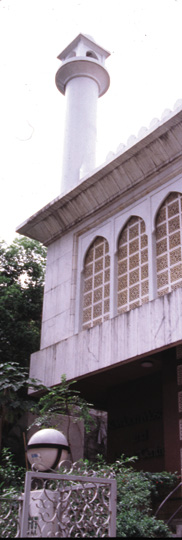



God's future in Hong Kong in doubt
Lutheran issue raises concerns
about religious,
assembly rights
By Apple Fu
 I
f the Joint Declaration and Basic Law promise religious freedom and assembly rights, then object- tions from China over the post-1997 Lutheran assembly have made Hong Kong people confused.
I
f the Joint Declaration and Basic Law promise religious freedom and assembly rights, then object- tions from China over the post-1997 Lutheran assembly have made Hong Kong people confused.The assembly was scheduled for 8 to 16 July 1997 to celebrate its 50th anniversary. However, the Xinhua News Agency urged that the meeting be postponed because it was too close to handover celebrations.
Finally, the controversial issue was resolved: The assembly will be held in July 1997, as planned.
Xinhua’s attempt not only led to a political discussion, but also sparked outrage among local religious communities.
Miss Rose Wu, general secretary of the Hong Kong Women’s Christian Council, said Xinhua’s request deviated from guarantees made by both the British and Chinese governments.
“This matter casts doubt on the prospects of religious freedom and assembly rights in the Territory after July 1997,” said Miss Wu.
Miss Wu was anxious that if the Chinese government claimed the power to intervene in a purely religious conference, similar actions against other activities would likely occur.
She said, “Having to get prior approval from China means that we are denied our rights.”
Associate Director of the Hong Kong Christian Industrial Committee Chan Ka Wai pointed out that the boundary between religious and political matters is ambiguous.
He said that China’s attitude about the conference implied a “political veto” power over religious events after 1997.
Dr. Philip Shen of the Department of Theology at The Chinese University of Hong Kong said China was showing its capability to oppose, or even ban, activities organized by local or international groups.
He guessed that China wanted to avoid embarrassment caused by delegates to international conferences. Demonstrations against the poor human rights condition in Tibet and the suppression of dissidents during the 1995 World Conference on Women are examples.
However, Ms Tsang Gar Yin, executive secretary of the Association for the Advancement of Feminism, said that they would abide by their principles and campaign against restrictions on rights of assembly.
Also, a community organizer of the Ecumenical Grassroots Development Centre, Miss Chan Yu, said it was normal for citizens to demand to express of their views.
“Press conferences and protests will be organized as long as our clients request them,” said she.
Apart from the Lutheran Assembly, the Faculty of Medicine at the University of Hong Kong will hold an International Narcotics Research Conference from 13 to 18 August next year.
Dr. T. M. Wong, a lecturer of the Department of Physiology at the University, said they did not inform the Chinese government of this academic event and received no request for deferment.
Meanwhile a spokesperson at Xinhua assured people that the Basic Law has made it clear that all religious activities and private events could be held freely after 1997.

